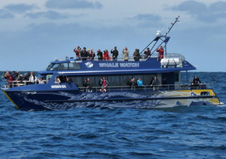 A marine biologist is combining her University of Otago PhD studies in tourism with a passion for science communication and documentary filmmaking to make the world of whales a better place.
A marine biologist is combining her University of Otago PhD studies in tourism with a passion for science communication and documentary filmmaking to make the world of whales a better place.
Wiebke Finkler has completed a project that she hopes will help improve sustainable management of whale watching around the world, while increasing public awareness about responsible whale watching practices.
Whale watching is a big venture involving over 13 million people across 119 countries annually.
Many of these countries do not regulate whale watching, although most have voluntary codes of practice or guidelines.
Whale watching practice therefore varies greatly – boats can go too close to whales in some parts of the world, or people swim with them.
Whale watching can have negative impacts on the whales, in terms of proximity and speed of whale-watching boats, boat crowding, underwater noise pollution and disturbance of important behaviours such as feeding, resting and nursing.
It is therefore important to better research, understand and respect the whale's environment, not just to protect them, but so they thrive.
She says the core message for eco-tourism ventures in the future is respectful encounters. “It's not banning whale watching, but re-looking at the enterprise from the whale's perspective, and continually improving processes and requirements if necessary.”
New Zealand whale watching is regulated and well managed compared to many other countries around the world, but times are changing, and Mrs Finkler believes there's work needed to demonstrate to potential customers that operators have the marine mammal's interests at heart.
She says public awareness is vital to driving change in good practice that accommodates the whale's needs.
“We need a paradigm shift in eco-tourism, so an increasingly well-informed public, particularly thanks to social media, will seek assurances the business is responsible and sustainable.
“Potential whale watchers who want to choose operators that demonstrate good practice will therefore need tools to identify the right behaviour. My solution is educational science commercial videos that connect with people in a meaningful ways; not just informing but helping visitors to understand, engage and care about the natural environment.
“We have to communicate science content in a way that touches people, and has relevance to their lives”.
She has developed 'SciCommercials', a science commercial video format merging marketing elements with science communication to serve as an educational management tool. Wiebke hopes to apply the model, currently used in the whale watching setting in her PhD study, to more effective science communication in other areas and is currently looking for other research opportunities.
Please click on the link here to watch the Good Whale Watching SciCommercial video.
“What is good for the whales is good for the people who operate tourism ventures, and for the visitors wanting to see whales in their natural environment. There are good operators who already understand it is about keeping the whale's needs first; the challenge for them is to walk the talk to show they are genuine.
“I see positive opportunities here for New Zealand whale watching – it can lead the world by being active in sustainability education, which will provide a new marketing edge.”
And what should whale watchers be looking for in a good operator?
• Local laws or codes of conduct that demonstrate a responsible watching excursion.
• Experienced naturalist or guides.
• Good information on what you can expect to see.
• The opportunity to provide feedback.








